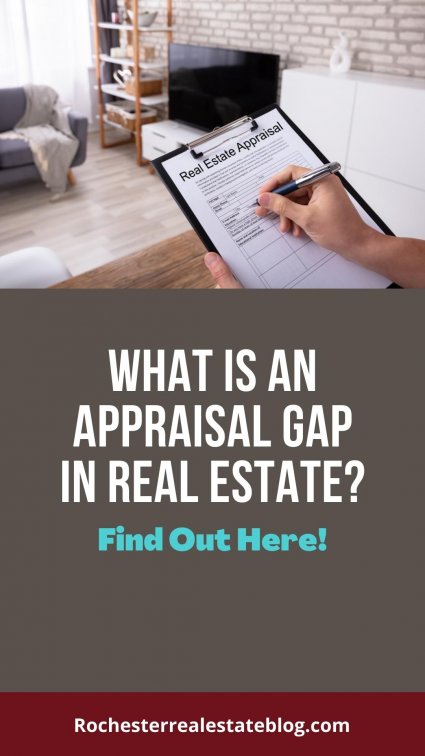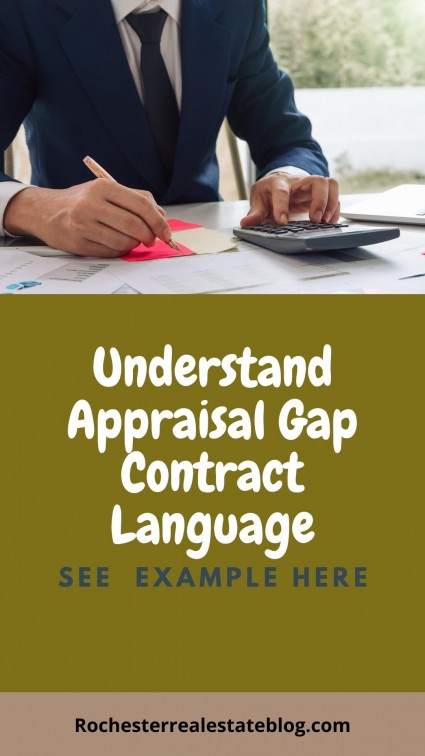What Buyers And Sellers Need To Know About An Appraisal Gap
Have questions about buying or selling a home?
Ask Now!
When buying a home, it is probably crucial that you don’t overpay. On the other hand, when you’re selling, you want your home to appraise for the agreed-upon sales price.
An appraisal gap occurs when there is a difference between the contract price of the home and the fair market value the bank appraiser puts on the property.
For example, if a home is under contract for $650,000, but the appraiser calculates the value at $625,000, there will be a $25,000 appraisal gap.
In hot real estate markets characterized by low inventory levels of homes for sale, it is not unusual to have bidding wars on many properties.
When multiple bidders compete for a property they love, it is not unusual for the price to reach levels higher than what the comparable sales say the property is worth.
It is one of the reasons many home sellers love cash sales. There is no worry that a low appraisal will kill the deal.
What is an Appraisal Gap Guarantee?
It can become disheartening when you are a buyer who has been putting in offers and losing to other bidders. Many potential buyers will try to improve their chances of competing with cash buyers.
One of the ways they will do this is by inserting an appraisal gap clause into the real estate contract. An appraisal gap clause states that the buyer will make up the difference between the appraised value and the sales price.
It’s often referred to as an appraisal gap guarantee. The appraisal gap guarantee clause can set a dollar amount of coverage or explicitly say the entire gap will be covered.
Sellers can feel comfortable excepting an offer from a buyer will an appraisal gap clause. They know that a low appraisal will no longer be a potential problem causing the sale to fall through.
It accomplishes the same thing as waiving the appraisal altogether.
Appraisal Gaps Need to Be Covered to Satisfy The Mortgage Lender
An appraisal gap clause is needed to begin with to satisfy the lender. In circumstances where there is insufficient equity in the property, the lender wants to know they are protected.
For example, if a buyer puts 10 percent down, the lender will only lend 90 percent of the appraised value. So, if the appraisal comes in low, the buyer will need to increase their down payment in order to satisfy the lender.
If there was ever a default with the mortgage, the lender wants to know they have proper equity. The lender would not want to provide a mortgage for a property that was underwater, so to speak.
Example Appraisal Gap Clause Language

Language such as this can be added to an offer to purchase contract stating a buyer’s intentions should there be an appraisal gap.
The buyer has waived their appraisal contingency and agrees to pay the difference in funds between what the lender is willing to lend and the purchase price if their appraisal does not equal at least that amount.
If there is a condition in the commitment letter or denial letter related to the appraised value or lack of buyer funds available to make up the difference, that condition will not be considered a valid reason for the buyer to void this agreement, and deposits will be refunded.
What Happens When There is No Appraisal Gap Clause
When there is no appraisal gap clause, there are quite a few things that can happen in a real estate transaction, including:
- The buyer terminates the sale due to not being able to procure financing.
- The seller reduces the sales price to match the appraised value
- The buyer puts up additional down payment funds to make up the difference between the sales price and appraisal amount.
- A compromise where the seller reduces the sales price by some amount and the buyer increases their down payment by some amount.
- Challenge the low appraisal and hope you win.
- Change lenders and get a new appraisal.
An Appraisal Gap Clause Can Increase Your Chances of Getting a House
Losing out on house after house gets old after a while. An appraisal gap clause can be an excellent tool to help win a bidding war. It is undoubtedly something that listing agents and home sellers look upon favorably.
It might be worth your while asking your buyer’s agent to insert appraisal gap language into your next offer. Just be sure you are comfortable coming up with the extra cash in the event the appraisal comes in very low.
Final Thoughts
Appraisal gaps are a common problem in the real estate market today. If the appraisal values of a property do not meet the sale price, this could create some issues.
When preparing for an appraisal, be aware that there may be a gap between the appraisal and sales contract price. Make sure you are prepared to address this issue if it comes up.
Before making an offer on a home, you should be aware of your options to deal with the situation if the appraisal does not go as planned.
An appraisal gap guarantee can help level the playing field when other buyers offer cash. If your offer is higher, you will be in a much better position to be the winning bidder.
It is wise for home buyers to speak with their real estate agent to formulate a strategy for increasing their chances to win a bidding war. An appraisal gap clause is one way to do it.
About the author: The above article on “What Buyers And Sellers Need To Know About An Appraisal Gap” was written by Bill Gassett. Bill has been working in the real estate industry for the past thirty-three years. He works for RE/MAX Executive Realty in Hopkinton Massachusetts. Bill loves providing trustworthy information to buyers, sellers, and fellow real estate agents to make the best possible decisions. His writing has been featured on RIS Media, National Association of Realtors, Inman News, Placester, Today.com, Credit Sesame, and others.
About Rochester’s Real Estate Blog: Rochester’s Real Estate Blog is owned and operated by Kyle Hiscock of the Hiscock Sold Team at RE/MAX Realty Group.
Since being launched in 2013, Kyle has published more than 150 quality, in-depth, and unique real estate related articles on the Rochester Real Estate Blog pertaining to topics varying from home selling to mortgages and everything in between! In addition to quality real estate related content, there are also many quality articles pertaining to the Greater Rochester NY area.
The Rochester Real Estate Blog has been recognized by many reputable websites as one of the best real estate blogs to visit and follow! In addition to being recognized as one of the best real estate blogs, Kyle has been recognized as one of the top Realtors on social media by several organizations and websites.
With over 40 years combined experience, if you’re thinking of selling or buying, we’d love to share our knowledge and expertise.
We service the following Greater Rochester NY areas: Irondequoit, Webster, Penfield, Pittsford, Fairport, Brighton, Greece, Gates, Hilton, Brockport, Mendon, Henrietta, Perinton, Churchville, Scottsville, East Rochester, Rush, Honeoye Falls, Chili, and Victor NY.